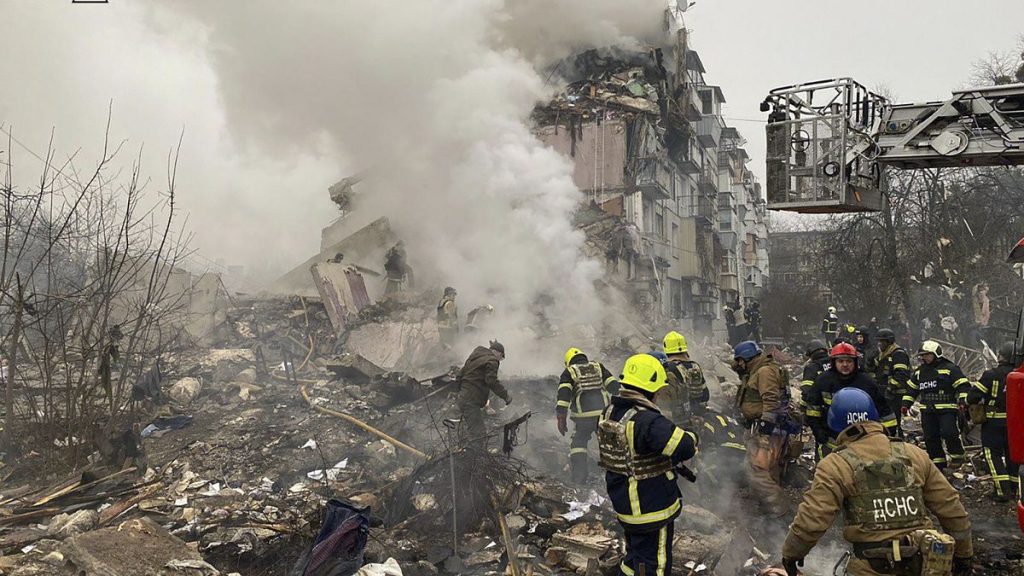The relentless barrage of Russian drone and missile strikes continued to inflict devastating consequences upon Ukrainian cities overnight and into Saturday, leaving a trail of death, destruction, and fear in its wake. At least five lives were tragically cut short, with scores injured, as residential buildings, critical infrastructure, and even cultural landmarks were indiscriminately targeted. The attacks served as a grim reminder of the ongoing conflict’s devastating toll on civilian populations and the nation’s cultural heritage.
The eastern Poltava region bore the brunt of one of the deadliest attacks, where a Russian airstrike obliterated a residential building in the early hours of Saturday morning. The devastating impact claimed the lives of at least four individuals, leaving ten others wounded, including a vulnerable child. Rescuers worked tirelessly amidst the chaotic scene, pulling 21 survivors from the wreckage of the partially collapsed building, while a nearby school was swiftly converted into a temporary sanctuary for the displaced and grieving. The attack also inflicted collateral damage on surrounding homes and vehicles, painting a picture of widespread devastation.
Odesa, a city renowned for its rich history and cultural significance, also found itself in the crosshairs of Russian aggression. Missiles rained down upon the city’s historic centre on Friday evening, leaving scars on iconic landmarks such as the Odesa Philharmonic, several museums, and the historic Bristol Hotel, a testament to the city’s architectural heritage dating back to 1899. Seven individuals were injured in the Odesa attack, and a gaping crater marred the entrance of the Bristol Hotel, where Norwegian diplomatic representatives were reportedly present at the time of the strike. The attack damaged the hotel extensively between floors one and four, and the ensuing fire consumed a portion of the roof. Firefighters bravely rescued a woman trapped on the second floor.
Eyewitness accounts from employees of businesses near the Bristol Hotel painted a harrowing picture of the attack’s immediate aftermath. They described the deafening explosions, the powerful blast wave, and the ensuing panic as people scrambled for safety. The chaos and fear were palpable as they recounted the moments of terror, emphasizing the profound psychological impact of these relentless attacks on the civilian population.
The northern city of Kharkiv also suffered under the onslaught, as a Russian Shahed drone strike targeted the Kholodnohirsk district. One person lost their life in this attack, while four others sustained injuries. The strike left a trail of destruction, damaging twenty private homes, shattering windows in countless buildings, and causing blast damage to four high-rise structures. The attack underscores the indiscriminate nature of the drone strikes, which often target residential areas, putting civilian lives at grave risk.
Zaporizhzhia faced one of the most extensive drone attacks to date, enduring a relentless barrage of 18 drones. While miraculously, only one person, a 57-year-old man, was injured by falling debris, the sheer scale of the attack is deeply concerning. The drones caused damage to private homes, apartment buildings, an educational institution symbolizing the disruption to daily life, and numerous vehicles. The attack further highlighted the increasing use of drone warfare in the conflict and the vulnerability of civilian infrastructure to these aerial assaults.
Beyond the immediate human cost and physical destruction, the attacks also disrupted essential services, with state energy company Ukrenergo reporting emergency power outages in multiple regions, including Kharkiv, Sumy, Poltava, Donetsk, Dnipropetrovsk, Zaporizhzhia, and Kirovohrad. These power outages further exacerbate the already challenging conditions faced by civilians, disrupting daily life, hindering recovery efforts, and adding to the overall sense of instability and insecurity. The attacks paint a grim picture of the ongoing conflict’s impact, extending beyond immediate casualties to encompass widespread disruption and the erosion of essential services, highlighting the profound and multifaceted challenges faced by Ukraine. The continued targeting of civilian infrastructure underscores the urgent need for international efforts to protect vulnerable populations and bring an end to the hostilities.

